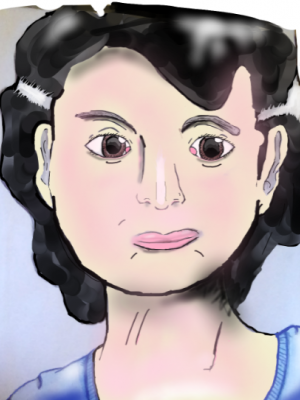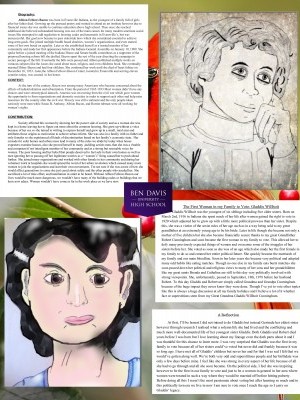Deja Brown
Ben Davis University High School | Indianapolis, IN | 10-12th Grade
Inspirational Family Member
Gladdis Willhoit
Gladdis Willhoit was the youngest of six siblings including five older sisters. She was born on March 2nd, 1916, in Indiana where she spent much of her life after women gained the right to vote in 1920, which adjusted her to grow up with a little more political prowess than her sister.
Despite this, she was a victim of the sexist rules of her age such as in a way being sold to my great grandfather at an extremely young age to be his bride. Later in life though, she became not only a mother of five children but she also became financially secure thanks to my great-grandfather Robert Cunningham and soon became the first woman in my family to vote. This allowed her to defy many previously expected things of women and overcome some of the struggles of her sisters before her. She voted as soon as she was of age, which also made her the first female in my family to do so and created her entire political future. She quickly became the matriarch of my family and our main bloodline. Soon in her later years she became very political and adopted many odd habits like eating matches. Though no one else in my family eats burnt matches she soon passed down her political and religious views to many of her sons and her grandchildren like my great-aunts Brenda and Cathalina who are still to this day very politically involved with strong viewpoints. She, unfortunately, passed in September, 18th, 1978 before her husband Robert.
To this day, Gladdis and Robert are simply called Grandma and Grandpa Cunningham because of the huge impact they never knew they were having. Though I’ve yet to vote other topics like this is always a huge discussion at all my family holidays and I believe a lot of it whether fact or superstition stems from my Great-Grandma Gladdis Willhoit Cunningham.
Historical Figure I Admire
Albion Fellows Bacon
Albion Fellows Bacon was born in Evansville Indiana, as the youngest of a family full of girls after her father died. Growing up she pursued poetry and wanted to attend an art institute, however due to financial issues she was unable to continue her education above high school. Then once she reached adulthood she believed substandard housing was one of the main causes for many modern American social issues. She attempted to add regulation to housing codes and tenements in Evansville, but was unsuccessful. Her goal now became to pass statewide laws which she considered essential to achieve long-term goals. She joined multiple health based charities, women’s organizations, and even started some of her own based on equality. Later as she established herself as a trusted member of her community and made her first appearance before the Indiana General Assembly on January 19, 1909. She spoke before a joint meeting of the Indiana House and Senate health committees as a supporter of the proposed housing reform bill she drafted. Bacon spent the rest of the year directing the campaign to secure passage of the bill. Eventually the bills were passed and Albion published multiple works on various subjects like the issues she cared about most, religion, and even children’s books. She eventually married Hilary Bacon and had four children. She continued her work until she died of heart failure on December 10, 1933. Later, the Albion Fellows Bacon Center, located in Evansville and serving eleven counties today, was created in her honor.
CONTEXT
At the turn of the century, Bacon was among many Americans who became concerned about the effects of industrialization and urbanization. From the period of 1865-1933, most women didn’t have any choices and were stereotypical damsels. America was recovering from the Civil War which gave women the opportunity to form organizations and domestic societies in order to support each other and helped raise resources for the country after the Civil War. Slavery was still a statement and the only people taken seriously were men while Susan B. Anthony, Albion Bacon, and Harriet Tubman were all working for women’s rights.
CONTRIBUTION
Society affected this woman by showing her the poorer side of society and as a woman she was kept in a home leaving her to figure out more about the common housing. She grew up —without a voice because of her sex so she turned to writing to express herself—in a small, rural area and attributes those origins as motivation to achieve urban reform. She was also in a family with no father and only females so she experienced all kinds of discrimination based on her family’s economic state. Her crusade for safer homes and urban areas led to many of the rules we abide by today when house inspectors examine houses, also she proved herself to many, including sexist men, that she was a valuable and competent if not intelligent member of her community and as a strong but reasonable voice for women. The poor housing and her belief that people deserved to feel safe in their own homes as well as men ignoring her or passing off her legitimate worries as a “women’s thing" caused her to push ahead further. She joined many organizations and worked with other females in her community and during her volunteer work at hospitals she would spread the word of her urban revolution which caused many more women to join the organizations and start their own movements. I’m not sure if she was aware of how she would affect generations to come; she just cared about safety and the other people who needed her. She sacrificed a lot of time, effort, and humiliation in order to be heard. Without Albion Fellows Bacon our lives would be much more dangerous, we wouldn’t have many of the building codes or buildings that we have nowadays. Women wouldn’t have come as far in the work place as we have now.
What the Project Means to Me
At first, I’ll be honest I did not intend to do Gladdis but instead Gertrude her eldest sister. However through research I realized what a solemn life she had lived and the conflicting and much more well-documented life of her youngest sister Gladdis. Both Gladdis and Robert died years before I was born but I love learning about my lineage even the dark parts about it and I was thankful for this chance to learn more. I was very surprised that Gladdis was the first in my family to vote because all of her sisters could’ve voted but never did and frankly because it was so long ago. I have met all of Gladdis’ children but never her and for that I was sad. I felt that we would’ve gotten along well. We’re both very odd and superstitious people and her birthdate was only a few days before mine. I feel like she was strong in every aspect of her life because of all she had to go through and all she soon became. On the political side, I feel she was inspiring however to be the first in our family to vote and just to be a woman in general in her area where women were treated in such a way where they would be married off before hitting puberty. Before doing all this I wasn’t the most passionate about voting but after learning so much and in this politically torn era we live in now I am sure to vote once I reach the age so I carry on Gladdis’ legacy.
Explore the Archive
Deadline Extended
There's still time to join Women Leading the Way.
Become a part of our storytelling archive. Enroll your class today.
Join the Project



